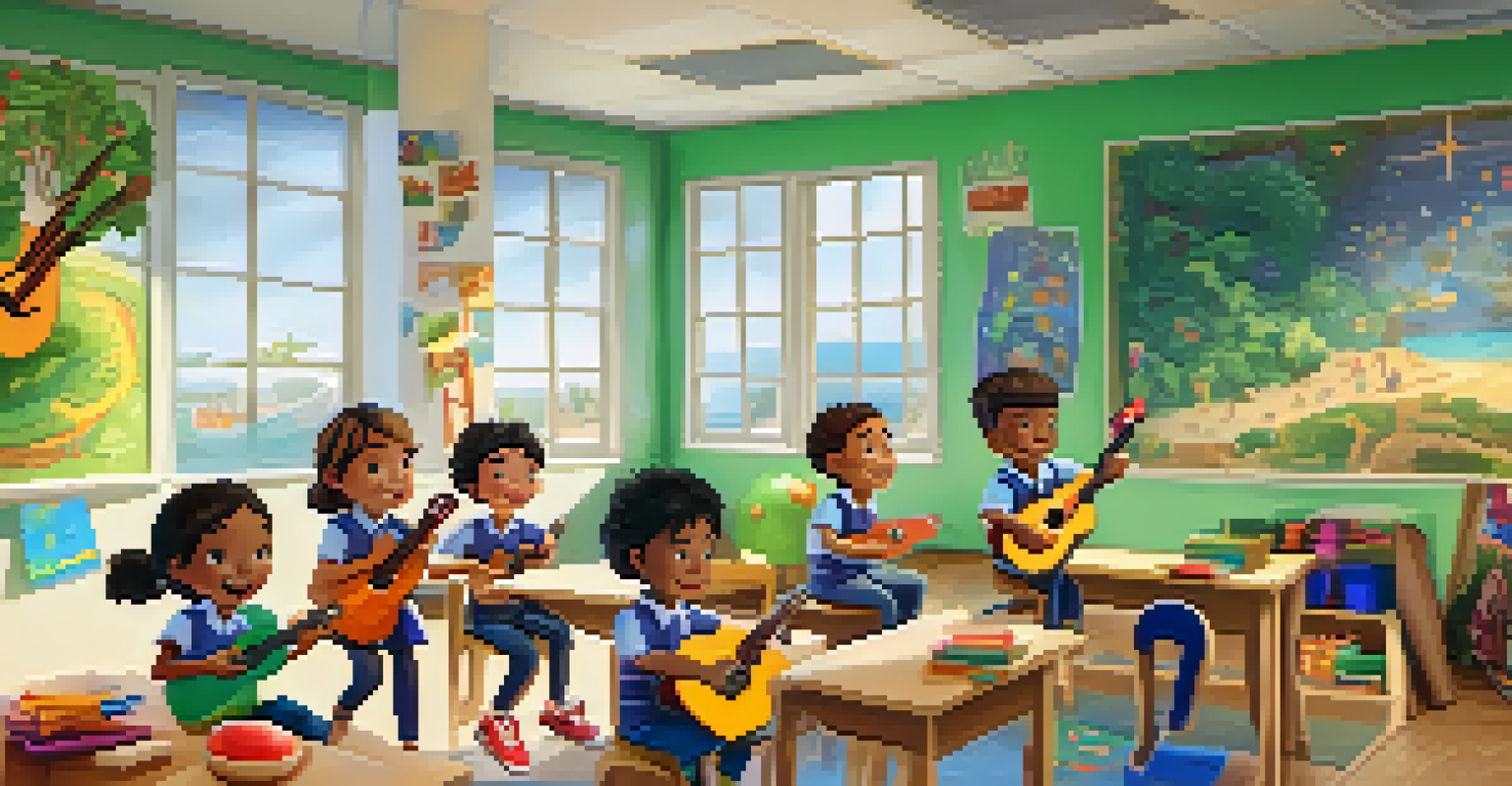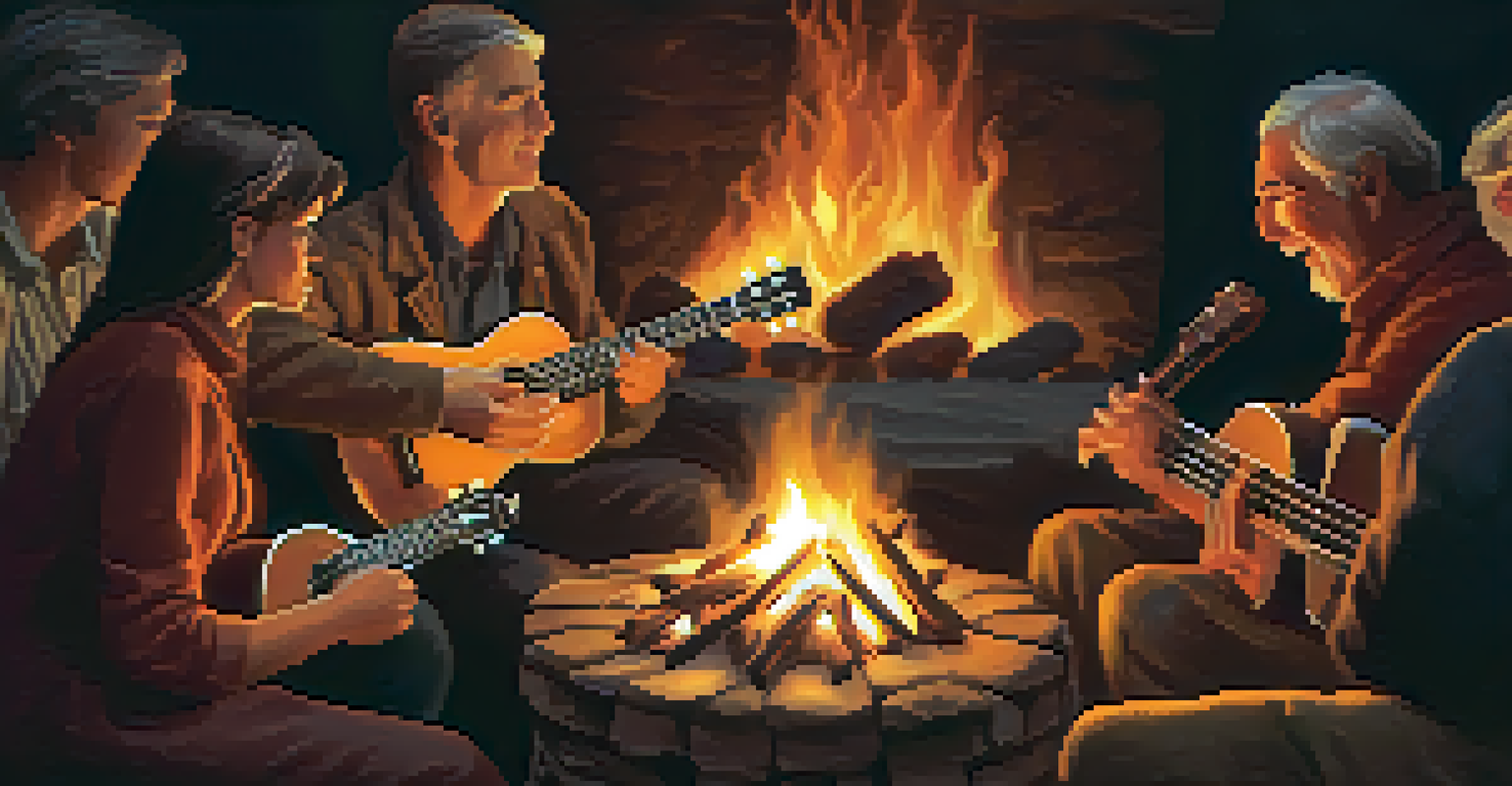The Power of Ukulele in Oral Storytelling Traditions

The Ukulele: A Brief Introduction to Its Origins
The ukulele, a small stringed instrument, has roots in Portuguese guitar-making traditions, particularly the braguinha. It was brought to Hawaii in the late 19th century, where it quickly became part of the local music scene. Unlike its larger cousins, the ukulele is portable and easy to learn, making it a perfect companion for storytelling.
Music can change the world because it can change people.
Its cheerful sound and simple chords allow anyone to pick it up and play a tune, making it accessible to people of all ages. This accessibility has made the ukulele a popular instrument for community gatherings and storytelling events. As people strum along, they create a warm atmosphere that invites participation and connection.
The ukulele's role in oral storytelling traditions is not just about music; it's about fostering relationships and creating shared experiences. By weaving songs into stories, storytellers can engage their audience on multiple levels, making tales more memorable and impactful.
The Role of Music in Storytelling
Music has been a powerful storytelling tool across cultures for centuries. It enhances narratives by setting the tone, evoking emotions, and creating a rhythm that captures listeners' attention. When combined with storytelling, music can transform a simple tale into an immersive experience.

In oral traditions, songs often carry the essence of a story, summarizing key themes or characters. The ukulele, with its bright and lively sound, can bring a sense of joy or nostalgia, depending on how it's played. This emotional connection helps audiences relate to the characters and their journeys.
Ukulele Enhances Storytelling
The ukulele's cheerful sound and simple chords make it a powerful tool for engaging storytelling, allowing for deeper emotional connections.
For example, consider a Hawaiian storyteller who strums a gentle melody while recounting legends of the islands. The ukulele not only provides a backdrop but also enhances the listener's connection to the culture and its history. In this way, music becomes a vital component of storytelling, making it richer and more engaging.
Cultural Significance of the Ukulele
The ukulele is more than just an instrument; it embodies the cultural heritage of Hawaii and influences various storytelling traditions. It represents a fusion of different cultures, blending Portuguese, Hawaiian, and American influences. This rich history allows the ukulele to resonate with diverse audiences.
The best way to predict the future is to create it.
In many Pacific Island cultures, the ukulele is used to share stories that reflect local values, traditions, and beliefs. Storytellers often use it to narrate tales of ancestors, nature spirits, or historical events, infusing each story with cultural significance. This connection to identity helps preserve these traditions for future generations.
By incorporating the ukulele into storytelling, performers can keep these cultural narratives alive, providing a sense of continuity and belonging. As listeners engage with these stories, they not only learn about the culture but also become part of its ongoing legacy.
The Ukulele as a Tool for Personal Narratives
Beyond traditional storytelling, the ukulele also empowers individuals to share their personal stories. Its approachable nature encourages people to express themselves through music and narrative, making it an ideal vehicle for personal reflection. Many find that playing the ukulele offers a sense of comfort and confidence when sharing their experiences.
For instance, someone might strum a few chords while recounting a meaningful life event, allowing the music to enhance their emotional expression. This combination of song and story can resonate deeply with listeners, fostering empathy and understanding. Personal narratives become more impactful when accompanied by the ukulele's soothing melodies.
Cultural Significance of Ukulele
The ukulele embodies a blend of cultures, reflecting Hawaiian heritage and helping preserve traditional narratives for future generations.
In community settings, individuals are often inspired to share their own stories when they hear others do the same. The ukulele facilitates this exchange, creating a space where vulnerability is celebrated. By using music as a medium for storytelling, people can connect on a deeper level, strengthening community bonds.
Modern Adaptations of Ukulele Storytelling
In today's digital age, the ukulele continues to evolve as a storytelling medium. With the rise of social media and video platforms, storytellers can now reach wider audiences than ever before. Many musicians and storytellers are combining their talents to create captivating performances that blend song and narrative.
For example, platforms like YouTube and TikTok have seen a surge in ukulele covers of popular songs paired with original stories. This modern twist allows for a fresh take on traditional storytelling while still honoring the instrument's roots. It demonstrates how the ukulele can adapt to contemporary contexts while remaining a powerful tool for connection.
Moreover, online ukulele communities encourage collaboration among storytellers and musicians, fostering creativity and innovation. These platforms provide spaces for people to share their stories and music, inspiring others to engage with the ukulele in new and exciting ways. The result is a vibrant tapestry of narratives that celebrates both tradition and modernity.
The Impact of Ukulele on Children’s Storytelling
The ukulele has a special place in children's storytelling, serving as a fantastic educational tool. Its light weight and simplicity make it perfect for young learners, encouraging them to explore music and storytelling together. Many educators have embraced the ukulele as a way to engage students in creative expression.
When children strum the ukulele while telling stories, they develop essential skills such as creativity, communication, and teamwork. It's not uncommon to see classrooms filled with laughter as kids sing songs that accompany their tales. This interactive approach not only makes learning fun but also fosters a love for storytelling from a young age.
Empowering Personal Narratives
The ukulele encourages individuals to share personal stories, fostering community bonds and emotional expression through music.
Additionally, the ukulele can help children connect with their cultural heritage through stories passed down from previous generations. By incorporating traditional tales into their play, children can gain a sense of identity and belonging. The joy of sharing stories through music helps cultivate a lifelong appreciation for both the ukulele and storytelling.
Conclusion: The Enduring Legacy of Ukulele Storytelling
As we explore the power of the ukulele in oral storytelling traditions, it becomes clear that this humble instrument holds a special place in many cultures. Its ability to enhance narratives, foster connections, and adapt to modern contexts makes it a timeless tool for storytellers. The ukulele not only celebrates the past but also paves the way for future generations to share their stories.
Through its cheerful strumming and melodic charm, the ukulele invites people to participate in storytelling traditions, whether through personal narratives or cultural retellings. Each strum resonates with the rich tapestry of human experience, reminding us of our shared stories. In essence, the ukulele becomes a bridge connecting us to one another.

Ultimately, the legacy of the ukulele in oral storytelling will continue to thrive as long as people are willing to share their voices, songs, and stories. It's a reminder that storytelling is a powerful form of expression that unites us, and with the ukulele in hand, anyone can become a storyteller.